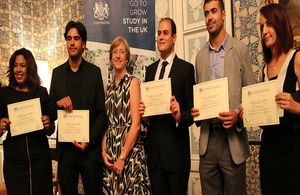The British Embassy in Tunisia is delighted to announce the selection of five young Tunisians as this year’s Chevening scholars.

The scholarships will allow them to pursue one-year postgraduate study in the UK from September 2017 in order to obtain a Master’s degree from a British university of their choice.
Chevening scholars are distinguished by their leadership potential and their commitment to Tunisia’s development within their areas of expertise.
Their study in the UK will provide them with the tools needed to make a difference in Tunisia once they return to their country. This year’s scholars will specialise in: commercial analysis; public policy; agriculture and rural development; psychology in conflict zones; and cultural studies.
Congratulating the successful candidates British Ambassador Louise de Sousa said: I commend the selected candidates for having passed the rigorous selection process. The Chevening programme reflects the UK’s belief in education as a tool for the development of societies. UK universities are ranked among the best in the world. And we are pleased to offer the young leaders of Tunisia the opportunity to participate in the prestigious Chevening programme.
Tunisia is particularly distinguished by its young people active in civil society, politics, and entrepreneurship. Thus, scholars of this year, past and future years, represent a concrete example of this distinguished youth, able to create a change. In the course of this academic year, candidates Nayress, Khawla, Kais, Mohamed Ali, and Ahmed will become ambassadors of Tunisian culture in the UK. They will also join an influential network of Chevening alumni, which now includes more than 44,000 members in 150 countries across the world.
Chevening Scholarship applications for the next academic year, 2018-19, are now being accepted. Applications must be submitted by 8 November 2017.
Scholarships fund one year postgraduate study in the UK in the following priority subject areas: Public administration, good governance and transparency; International relations and political participation; Journalism and strengthening the capacity of the media; Rule of law and Security and the fight against terrorism.










